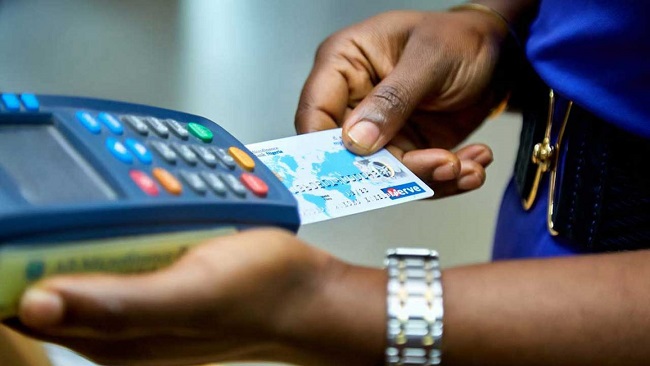
Digital payments innovation has helped to drive financial inclusion across the country; but with this is the evil twin called fraud. ADETOLA BADEMOSI in this piece, looks at how the menace can impact on its growth particularly among the unlearned and rural areas.
TROUBLED Mrs Nnenna Tochukwu rushed out of her rented one-bedroom apartment in a floral shift dress with a nine-month old baby strapped to her back.

She looked apprehensive while rushing to a Point-Of-Sale (POS) operator’s shop adjacent her house, and at the same time speaking with someone over the phone.
While she was home, her husband had called to ask if she withdrew N50,000 from their joint account which she denied.
However, within the space of 10 minutes, a total sum of N100,000 had mysteriously been debited from the account. The transaction source simply stated: “web/POS.”
“That was our savings since we got married. We had N600,000 in the account, but they already withdrew N100,000 before we could block the ATM. My husband is an Uber driver. We were keeping the money to start a business,” she said as her finger caught the tears that rolled freely from her eyes.
In a similar scenario, Damilare Akinyemi in February 2022, on his way home from work, approached a POS operator around Banex, Abuja for cash withdrawal.
After trying the failed transaction three consecutive times, he collected his ATM and tried to locate an ATM machine to make his cash withdrawal.
However, while in the vehicle on his way home, his phone beeped with multiple debit alerts. At first, Akinyemi had thought the previous failed transactions were debited after all.
But on a closer look, the alerts were not the amount he initially planned to withdraw, thus raising concerns.
“I tried to withdraw N5,000 but the first debit I got was N20,000, then N20,000, N5000 and another N20,000. I rushed back that night to the place but when I got there, the guy was no longer there. Up till today, I never saw the guy at that spot again,” said Akinyemi.
This sort of experience has left Nigerians even more wary as banks are unhelpful in either tracking fraudulent transactions or recovering the stolen funds.
“When I went to the bank, they said the transaction could not be traced because it had moved from one account to another. The only thing they did was to block my card,” said Akinyemi disappointedly, adding that “After some back and forth, I just resigned to my fate.”
Reports on the sudden disappearance of funds from customers’ bank accounts are no longer news. More worrisome is banks’ inability to give explanations for these unauthorised debits.
Statistics from the Nigeria Inter-Bank Settlement System Plc (NIBSS) showed that POS is the second most exploited channel by fraudsters after the mobile system with an approximate actual loss of N4 billion as of October 2023.
Nigeria’s booming POS business
Prior to 2011, payments system in Nigeria was predominantly cash-based but with the introduction of the cashless policy, payment operations became increasingly characterised by funds transfers, ATMs, and other electronic payment systems.
The electronic payments system comprises automated teller machines (ATM), point-of-sale (PoS) terminals, internet payment, mobile payment and wire transfers among others.
The Central Bank of Nigeria (CBN) formally introduced the POS system in 2012 as a means of bringing financial services closer to the people.
Through what it identifies as agent banking, that is the use of third parties for the provision of banking and other financial services to the public, CBN has been able to drive financial inclusion even in the core remote areas where traditional banking services are not accessed.
“It enables banks and other financial institutions extend their services to locations where they may not have physical presence.
“The agent banking initiative in Nigeria has proved to be a viable tool for achievement of the financial inclusion targets set for the country,” it said.
Over the years, the agent banking initiative driven by fintechs has resulted in the ubiquity of financial services agents across Nigeria, resulting in a significant and growing portion of financial transactions being conducted through the agents.
Transactions such as cash withdrawals, deposits, transfers and other payments services can now be conducted via the POS with a debit card popularly referred to as an ATM card.
Data from CBN showed that between January 2018 and December 2022, POS transactions grew from 296 million valued at N2.4 trillion to four billion at N41 trillion.
However, as more Nigerians continue to embrace the cashless policy, fraudsters have infiltrated the system, thus defrauding unsuspecting members of the public of their hard-earned money.
Akinyemi and Tochukwu are just a few of several other Nigerians who have fallen victim to the ugly trend.
Threat to digital payments growth
The threat linked to digital payments may sooner than later impact on the financial inclusion growth recorded especially in underserved areas of Nigeria.
“I don’t do online transactions that will require my ATM details,” said Moreen Simpson, a media consultant. “You can hardly even see me patronise all these POS operators because any small thing now, you will start hearing stories. So, I prefer doing my transactions in the banking hall or banking app.”
To corroborate this, a customer care staffer with a new generation bank who simply wanted to be identified as Temiloluwa, said as a result of the increasing digital payment fraud, some unlearned customers have lost faith in the credibility of the banking system.
“Just last week, a woman came to the bank asking us to block her ATM card because the last N2,000 on her account got debited. She even swore never to put her money in the bank again,” she disclosed.
No doubt, these bad experiences have left a bitter taste in the mouth of victims and may negatively impact on the gains of the digital payments policy. In the case of Akinyemi, the incident left him devastated thus fuelling his apathy for online transactions especially POS withdrawals.
“I won’t lie to you, I suffered for it. It was my entire money they debited,” Akinyemi retorted;” it took me three months to get another ATM because somehow, I was scared that they could, through the old card, access the new one.”
“It really messed up my thoughts,” he concluded.
True to this, a survey conducted by Kaspersky on digital payment in Nigeria also states that the impact of a cyber threat targeting digital payments does not just impose a financial burden on consumers, but also affects them psychologically.
The survey showed that 43 percent of users reported that they have less trust in digital payment providers after losing their money.
Experts react
Over the years, fintech companies have become more popular as they provide diverse digital payment options.
Each of them has their own customised POS terminals.
However, Ms. Rebecca Alao, a banking expert, said such companies give out POS without adequate Know-Your-Customer (KYC) checks, thus fuelling fraud tendencies.
“The issue we have with these fintech companies that issue POS is the lack of KYC. For commercial banks, before we assign a POS to an individual, we ensure that we have our KYC intact, so that when issues like this happen, we can easily take action and ensure that they are brought to book,” she said.
To this end, she urged them to ensure adequate KYC checks.
On his part, a cybersecurity expert, Mr Remi Afon, said customer information can also be gathered through card skimming.
According to him, skimming allows the installation of a small device on the card reader that captures the information stored on a customer’s credit or debit card.
“The scammers can then use this information to make fraudulent transactions, draining the customer’s bank account,” he noted.
Similarly, he noted that criminals sometimes set up fake POS terminals to collect card information from unsuspecting users. “These fake terminals look legitimate but are used for fraudulent purposes,” he added.
On ways to forestall the threat, he stressed the need for more investments in sophisticated fraud detection systems that use artificial intelligence and machine learning algorithms to identify unusual patterns and suspicious transactions.
“They should set transaction limits on POS transactions and ATM withdrawals to minimise potential losses in case of fraud,” he said.
Also recently, the Group Managing Director of Routelink Group, Femi Adeoti in an interview, said there is the need to implement strong security measures.
“Improve the use of technologies like encryption, two-factor authentication, and tokenisation to protect sensitive financial information and prevent unauthorised access to accounts,” he added.
No doubt, digital payment systems have come to stay but in order to continue to drive financial inclusion among the unbanked, there is a need for a secured transaction guarantee.
- This report is produced under the DPI Africa Journalism Fellowship Programme of the Media Foundation for West Africa and Co-Develop.
READ ALSO FROM NIGERIAN TRIBUNE







